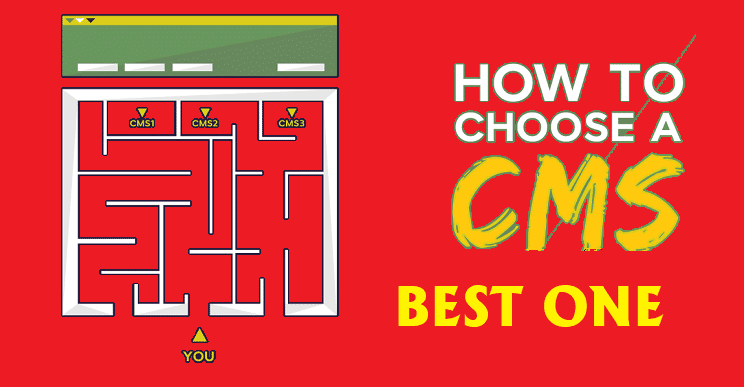Building a website is a crucial step for small businesses, but not everyone has the time, budget, or coding skills to create a site from scratch. Thankfully, there are several Content Management Systems (CMS) available that cater specifically to small businesses. Whether you want to start a blog, an online store, or a service-based site, there’s a CMS out there tailored to your needs.
In this article, we’ll guide you through some of the best CMS platforms, highlighting their unique features, pros, and cons. From e-commerce giants like Shopify to versatile platforms like WordPress and Wix, you’ll learn which CMS is the right fit for your business.
WordPress: The All-Rounder
Best For: Blogs, small businesses, portfolio sites, and e-commerce with plugins
Features: User-friendly interface, thousands of plugins and themes, SEO-friendly
Pros: Highly customizable, vast community support, flexible for any type of business
Cons: Requires maintenance and updates, may need premium themes or plugins for advanced features

WordPress is the most popular CMS in the world, powering over 40% of all websites. It’s versatile and can be adapted to suit nearly any business type, from blogs to e-commerce stores. With an intuitive dashboard, WordPress allows even beginners to manage content, design, and functionality easily. However, it may require some technical know-how if you want to use advanced plugins or customize themes extensively.
WordPress has one of the best functionalities of all other CMS platforms available on the internet. It’s basically a superbike in a CMS race. WordPress has the ability to create almost every website with the use of its Plugins.
Plugins are the backbone of WordPress. They basically allow you to design your website as you think of it. Do you want to create your own e-commerce store? There’s a superpower full plugin for that. Want to show off your photo gallery? Don’t worry; there’s a range plugin for that. WordPress is really unbitable in terms of functionality. However, like every CMS, it comes with its disadvantages.
Shopify: The E-Commerce Specialist
Best For: Online stores, businesses selling products or services
Features: Built-in payment processing, product management, SEO tools
Pros: Easy to set up, great for dropshipping, 24/7 support
Cons: Monthly fees, limited customization outside the provided templates
Shopify is a leading CMS for e-commerce businesses, especially for those who want a hassle-free way to sell products online. With built-in tools for inventory management, payments, and marketing, Shopify makes it easy to launch an online store quickly. Its clean, responsive templates are optimized for conversion, making it an excellent choice for entrepreneurs looking to maximize their sales.

So, if you ask about the best CMS platform for e-commerce? In cloud-based e-commerce platforms, no one stands with Shopify. The powerful and simple-to-use user interface makes designing an e-commerce website effortless.
You can enter thousands of selling products on your site by simply using features such as category tags and many more. These features help you automatically tag your selected products into different categories on your e-commerce site.
Wix: The Drag-and-Drop Solution
Best For: Service businesses, personal websites, small e-commerce
Features: Drag-and-drop builder, customizable templates, built-in SEO tools
Pros: No coding required, easy to use, affordable plans
Cons: Limited scalability, ads on the free plan, fewer integrations compared to WordPress
Wix is an excellent option for small businesses that want to build a visually appealing website without touching a line of code. Its drag-and-drop interface allows users to design pages exactly how they envision, with plenty of templates tailored to different industries. However, if you plan to grow your website significantly, Wix’s limited scalability might become a constraint.

The idea of designing and creating a professional-looking website can be almost impossible for new users as it’s normally given to professionals. However, with Wix, you feel a little bit like a pro to yourself.
Wix has a very strong reputation for creating the easiest CMS platform on the web, with its extremely easy-to-use interface design. It also has effective plugins and mind-blogging drag-and-drop features.
Squarespace: Design-Focused CMS
Best For: Creatives, restaurants, small businesses needing beautiful design
Features: Stunning templates, built-in e-commerce, blogging capabilities
Pros: Modern and sleek design, user-friendly, excellent customer support
Cons: Less flexible than WordPress, fewer integrations, monthly subscription fees
Squarespace is known for its aesthetically pleasing templates that cater especially to creatives, photographers, and boutique businesses. It combines style with functionality, offering easy-to-use tools for building pages, selling products, and managing content. Squarespace’s design-focused approach makes it ideal for those who value visuals but might not require the extensive functionality that other CMS platforms offer.
Joomla: The Techie’s Choice
Best For: Tech-savvy users, complex websites, community portals
Features: Powerful content management, flexible, multilingual support
Pros: Highly customizable, advanced user management, strong security
Cons: Steeper learning curve, requires some technical skills, fewer themes compared to WordPress
Joomla offers a robust platform for those who need more control over their website’s functionality. It’s less beginner-friendly but provides extensive customization options for tech-savvy users or those working with developers. Joomla is a good choice if your website requires complex structures or specific functionalities that other CMS platforms cannot provide.
Conclusion: Choosing the Best CMS for Your Small Business
Selecting the right CMS for your business website depends on your specific needs, budget, and technical skills. WordPress remains the most versatile, making it a top choice for a wide range of businesses.
Shopify shines in e-commerce, while Wix and Squarespace offer simplicity and design for less complex sites. Joomla caters to those looking for more advanced options. Consider what matters most to your business—be it design, e-commerce capabilities, or ease of use—and choose accordingly.
